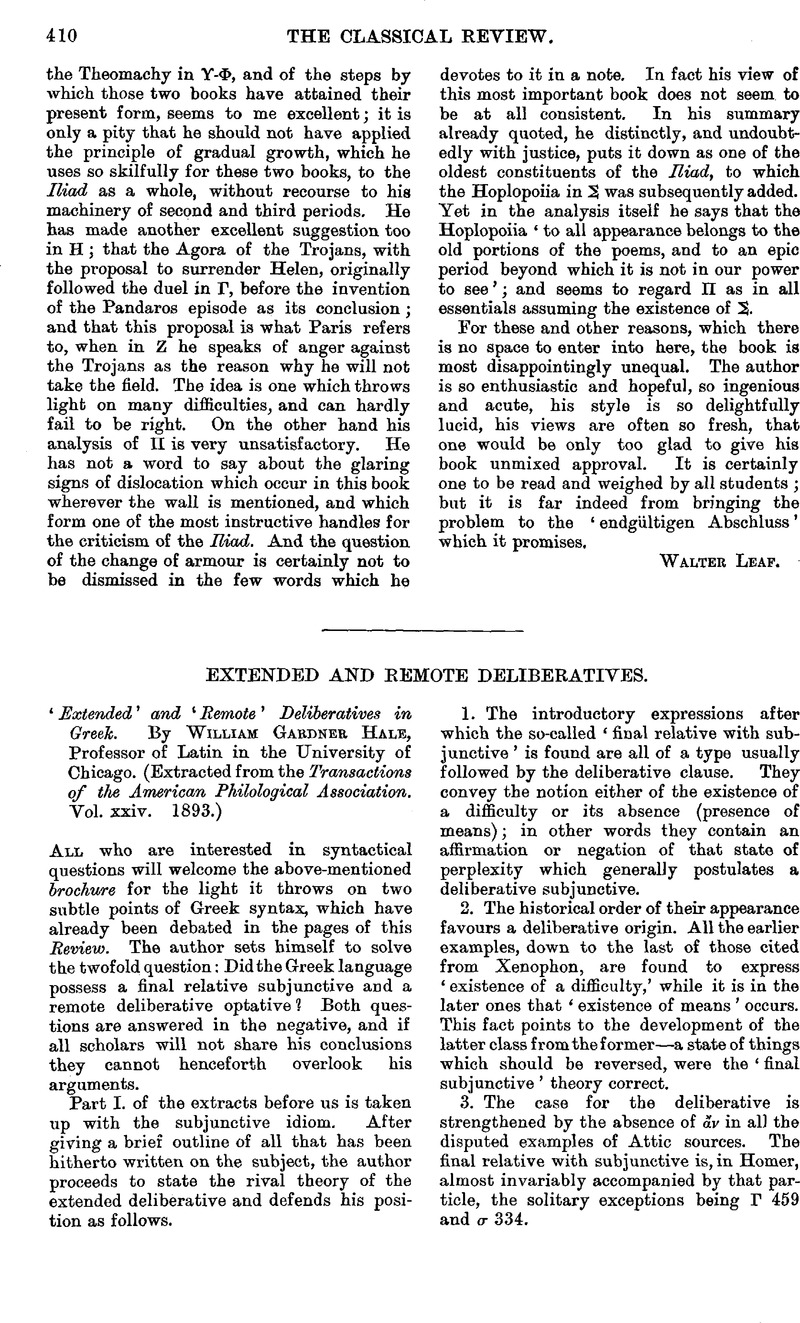No CrossRef data available.
Article contents
Extended and Remote Deliberatives - ‘Extended’ and ‘Remote’ Deliberatives in Greek. By William Gardner Hale, Professor of Latin in the University of Chicago. (Extracted from the Transactions of the American Philological Association. Vol. xxiv. 1893.)
Published online by Cambridge University Press: 27 October 2009
Abstract

- Type
- Reviews
- Information
- Copyright
- Copyright © The Classical Association 1894
References
page 411 note 1 I may perhaps be permitted to append here the arguments which, in my opinion, militate against regarding ![]() as a certain instance of virtual Or. Obi.
as a certain instance of virtual Or. Obi.
1. If this were an incontestable case of quoted statement—to the exclusion of other influences—it should admit of being rendered ; ‘Where, as she thought, none saw.’ Compare Plato Rep. 614 B ![]() —‘which, as he alleged, he saw’ ; cf. also Soph. O.T. 1246 and Pind. ol. 6, 49. The direct thought or utterance would have contained
—‘which, as he alleged, he saw’ ; cf. also Soph. O.T. 1246 and Pind. ol. 6, 49. The direct thought or utterance would have contained ![]() . If either of the three former, we should have a genuine case of virtual Or. Obi., but the consequent rendering would not suit the context ; if the latter, we are on debateable ground, as the question of sequence offers a difficulty whether the relative clause expresses a statement of fact or of purpose.
. If either of the three former, we should have a genuine case of virtual Or. Obi., but the consequent rendering would not suit the context ; if the latter, we are on debateable ground, as the question of sequence offers a difficulty whether the relative clause expresses a statement of fact or of purpose.
2. The English rendering: ‘Where, as she thought, none would see,’ is ambiguous and may be but a mere paraphrase of the ordinary final construction. It is one of our ways of expressing intention.
page 412 note 1 For present purposes it matters little whether we call them final or consecutive.
page 412 note 2 Literally : ‘no hopes remain as to whither I am to turn to escape.’
page 412 note 3 Paley discussed most of the mooted passages as they came before him in his commentary on the Attic Tragedians. To him the omission of ἄν in potential clauses seemed a matter of course, and he adheres to the MS. reading in many places where other critics insert ἄν, e.g. Aesch. Ag. 535, 1346 (Paley's numbering), see also Bacch. 747. Cf. the indices to his Aeschylus and Euripides (vols. i. and ii.) under the word ‘Optative.’
page 413 note 1 It might have been added that some of those retained by Paley have as good authority as those cited here, i.e. Aesch. Ag. 535 (Paley) 1346 (ditto), Eur. Bacch. 747, Helen. 992, Hipp. 868 (Paley). Of course it is needless to add that instances occur in Homer, Pindar and Theocritus.
page 413 note 2 Paley seems to have hit on the same explanation. On Ag. 603 he comments thus : ‘The optative expresses a purely mental conception apart from any condition.’ And on Eur. Alc. 52 he writes : ‘It is a peculiarity of relative words to take the optative without ἄν in some cases where a merely contingent event is conceived.’ By ‘merely contingent’ he means what Prof. Hale terms ‘bare possibility.’.




